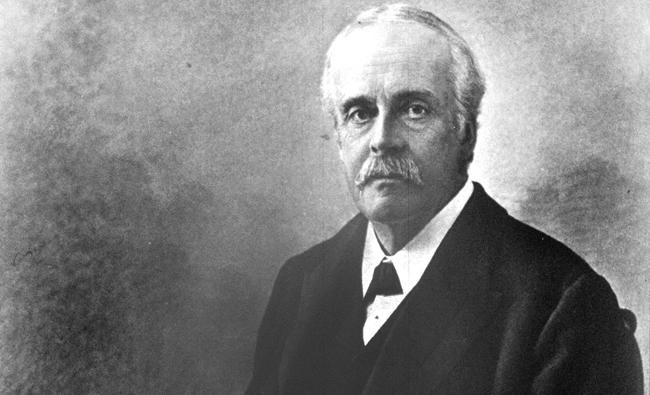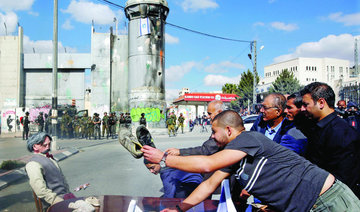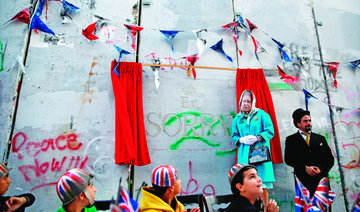LONDON: It was Arthur James Balfour’s hand that signed one of the most incendiary government letters documented in global history.
Today marks the 100th anniversary of the Balfour Declaration, when the British politician stated in a note to his colleague, Lord Rothschild: “His Majesty’s Government views with favor the establishment in Palestine of a national home for the Jewish people, and will use their best endeavors to facilitate the achievement of this object …”
The grave and protracted ramifications of this letter require little explanation. But what of the man behind the pen? Arthur James Balfour — or AJB, as he was known at the time of the declaration — was born in Scotland in July 1848 and served in the British government for 28 years, including a term as prime minister (1902-1905). It was during his four-year stint as foreign secretary (1916-1919) that Balfour penned the declaration. He died aged 81 in 1930.
As an intellectual and somewhat effete youth, Balfour was educated at Eton College and Cambridge University with a degree in moral sciences and only a dint of an interest in politics. According to journalists of the day, he viewed himself as a philosopher, but his elite familial connections soon saw Balfour climb the ladders of political power with ease.
“Lord Balfour was a statesman almost in spite of himself,” said the late politician’s New York Times obituary. “By inclination he was the philosopher… the thinker, the cultured gentleman of leisure, spending his life among the books and music he loved and knew so well.”
According to the New York Times: “In Cambridge they called him ‘Miss Nancy.’ When he first entered Parliament he was ‘Miss Balfour.’ His health was so delicate that it was a question whether he would not have to spend his winters in Egypt and forego any idea of a political career.”
Indeed, at the height of his career as Britain’s prime minister, Balfour himself said: “Give me my books, my golf clubs and my leisure, and I would ask for nothing more… If I could give up politics without disorganizing things or neglecting my duty, I would gladly do so.”
But vehement opponents such as the prominent author and journalist Harold Begbie claimed that Balfour was entirely at home in office. “Little as the general public may suspect it, the charming, gracious and cultured Mr. Balfour is the most egotistical of men, and a man who would make almost any sacrifice to remain in office,” spat Begbie in his book, “The Mirrors of Downing Street: Some Political Reflections.”
For a man whose words put into motion one of the world’s most contentious land occupations, Balfour’s political career began in earnest. In 1878 he became private secretary to his uncle, the Marquess of Salisbury, who was foreign secretary in the Conservative government headed by Benjamin Disraeli. In the 1885 general election, Balfour was elected to represent the East Manchester constituency.
According to Balfour’s official profile on the UK parliamentary website, it was thought that he was “merely entertaining himself” with politics: “Indeed the House did not take him quite seriously. Members looked upon him as just a young member of the governing classes who remained in the House because it was the proper thing for a man of family to do.”
However, later on Balfour joined the Cabinet as secretary for Scotland and then for Ireland under Lord Salisbury. Despite widespread doubt that he was up to the demanding job of Ireland secretary, Balfour proved to be a tough incumbent, restoring the rule of law. His land development legislation was considered well judged and has been credited with calming the Irish conflict for a generation.
Balfour eventually replaced his uncle as prime minister in 1902. The New York Times lamented: “Although (Balfour) was intimately connected with British politics for over half a century, he always gave the impression of a man who had withdrawn within himself.
“To most of the British people he was an abstraction, a paradox, an enigma that they could not solve. When they heard him speak it was only to feel more deeply puzzled.”
Balfour’s obituary claimed that his mind was that of a “subtle, analytical thinker meeting each new problem as a trained logician dealing with abstract ideas, not with people.”
Balfour was also famous for his supercilious attitude. Begbie, in his book, criticized Balfour for his manner and self-obsession. “This ‘Balfourian manner,’ as I understand it, has its roots in an attitude of mind — an attitude of convinced superiority which insists in the first place on complete detachment from the enthusiasms of the human race, and in the second place on keeping the vulgar world at arm’s length,” he wrote.
Bernard Regan, author of “The Balfour Declaration,” which is due to be published today, remarked that the accusations of Balfour’s haughty character come as “no surprise.”
Regan told Arab News: “There was a general attitude of that time in Parliament of imperial arrogance and racial superiority. It was thought that western Europeans were at the top and Jews were a part of that, while indigenous people like Arabs were looked down upon.”
Balfour famously said of himself: “I am more or less happy when being praised, not very comfortable when being abused, but I have moments of uneasiness when being explained.”
Who was Arthur James Balfour?
Who was Arthur James Balfour?

UN rights chief Shocked by ‘unbearable’ Darfur atrocities

- Mediation efforts have failed to produce a ceasefire, even after international outrage intensified last year with reports of mass killings, rape, and abductions during the RSF’s takeover of El-Fasher in Darfur
PORT SUDAN: Nearly three years of war have put the Sudanese people through “hell,” the UN’s rights chief said on Sunday, blasting the vast sums spent on advanced weaponry at the expense of humanitarian aid and the recruitment of child soldiers.
Since April 2023, Sudan has been gripped by a conflict between the army and the paramilitary Rapid Support Forces that has left tens of thousands of people dead and around 11 million displaced.
Speaking in Port Sudan during his first wartime visit, UN Human Rights commissioner Volker Turk said the population had endured “horror and hell,” calling it “despicable” that funds that “should be used to alleviate the suffering of the population” are instead spent on advanced weapons, particularly drones.
More than 21 million people are facing acute food insecurity, and two-thirds of Sudan’s population is in urgent need of humanitarian aid, according to the UN.
In addition to the world’s largest hunger and displacement crisis, Sudan is also facing “the increasing militarization of society by all parties to the conflict, including through the arming of civilians and recruitment and use of children,” Turk added.
He said he had heard testimony of “unbearable” atrocities from survivors of attacks in Darfur, and warned of similar crimes unfolding in the Kordofan region — the current epicenter of the fighting.
Testimony of these atrocities must be heard by “the commanders of this conflict and those who are arming, funding and profiting from this war,” he said.
Mediation efforts have failed to produce a ceasefire, even after international outrage intensified last year with reports of mass killings, rape, and abductions during the RSF’s takeover of El-Fasher in Darfur.
“We must ensure that the perpetrators of these horrific violations face justice regardless of the affiliation,” Turk said on Sunday, adding that repeated attacks on civilian infrastructure could constitute “war crimes.”
He called on both sides to “cease intolerable attacks against civilian objects that are indispensable to the civilian population, including markets, health facilities, schools and shelters.”
Turk again warned on Sunday that crimes similar to those seen in El-Fasher could recur in volatile Kordofan, where the RSF has advanced, besieging and attacking several key cities.
Hundreds of thousands face starvation across the region, where more than 65,000 people have been displaced since October, according to the latest UN figures.














